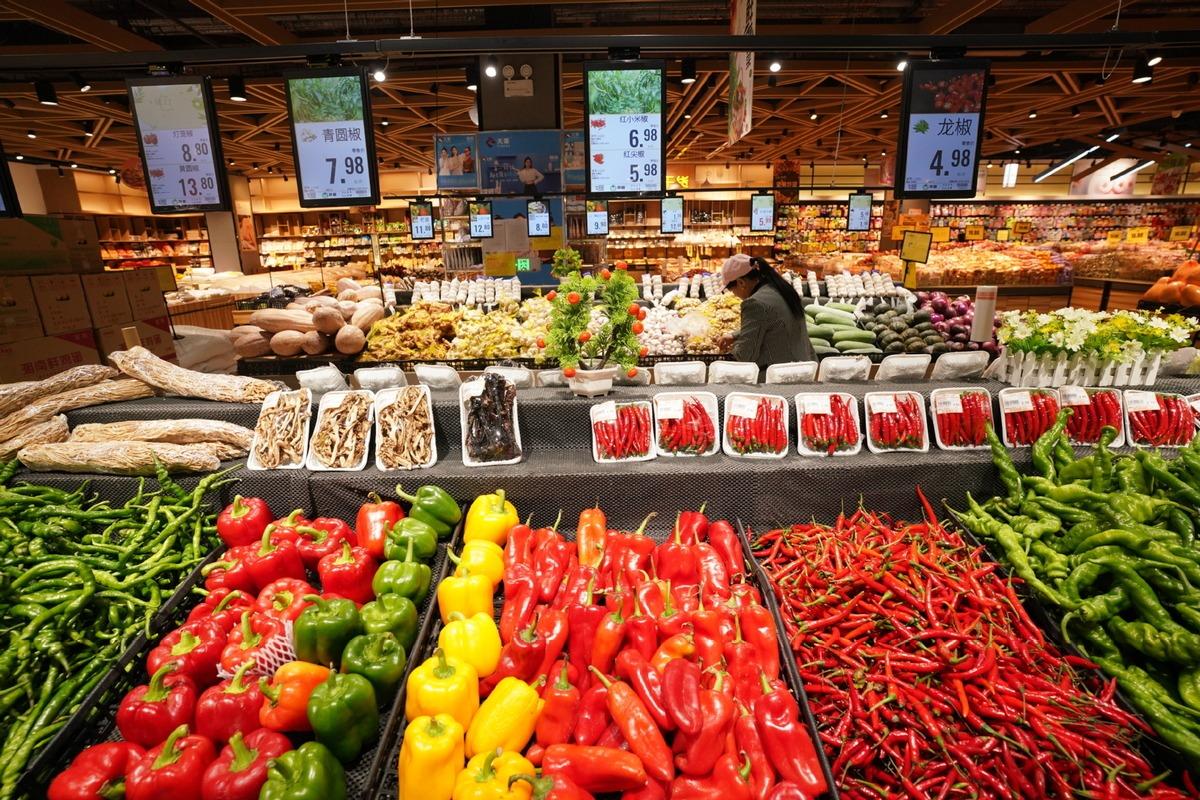Targeted measures expected to boost domestic demand, spur consumption
 A woman selects vegetables at a supermarket in Huaihua city of Hunan province, Oct 13, 2023. (PHOTO / XINHUA)
A woman selects vegetables at a supermarket in Huaihua city of Hunan province, Oct 13, 2023. (PHOTO / XINHUA)
China's consumer prices dropped for the second consecutive month in November, indicating still-weak demand and backing the case for further policy support, including a likely reduction in the reserve requirement ratio for banks, economists said on Sunday.
Despite challenges and headwinds, they expressed optimism over the potential for a growth rebound next year given some recent signs of stabilization. They expect to see more measures rolled out to boost domestic demand, spur consumption, help deliver presold homes and help local governments get on the right track on financial issues.
The meeting of the Political Bureau of the Communist Party of China Central Committee, which was held on Friday, indicated that solid steps will be taken to effectively enhance economic vitality, prevent and defuse risks, and improve social expectations as part of the nation's efforts to promote economic growth in 2024.
The meeting emphasized the need to consolidate and enhance the momentum of economic recovery, and strive to promote overall improvement in economic operations to achieve both qualitative and quantitative growth. Further efforts will be made to expand domestic demand to form a virtuous cycle of mutual promotion between consumption and investment.
Data released by the National Bureau of Statistics on Saturday offered the latest official snapshot of the pressures facing the economy, as the country's consumer price index — a main gauge of inflation — dropped by 0.5 percent year-on-year in November after a 0.2 percent dip in October.
The growth in core CPI, which excludes volatile food and energy prices and is deemed a better gauge of the supply-demand relationship in the economy, came in at 0.6 percent year-on-year in November, the same as October.
Xiong Yuan, chief economist at Guosheng Securities, said the drop in consumer prices indicates the still-weak internal driving force, insufficient demand and low confidence, leaving open the possibilities of further interest rate cuts and a reduction in the reserve requirement ratio as early as this month.
"Although the economy is gradually stabilizing, the foundation for recovery is not yet solid," Xiong said. "More policy support is likely this year, including pledged supplementary lending, allocating some of the 2024 quota for local government special bonds in advance and further easing of homebuying curbs in first-tier cities."
Noting that Friday's meeting has set the tone for China's economic work next year, Xiong said the nation will implement expansionary policies to stimulate the economy and will likely set its 2024 annual growth target similar to this year's goal of about 5 percent.
Citing the negative CPI growth and the steps mapped out at the key meeting, Wen Bin, chief economist at China Minsheng Bank, said that expanding domestic demand will be among the key priorities to bolster the economy, and consumption will play a fundamental role in driving economic growth.
"It is essential to expand consumption by increasing household income," Wen said. "Efforts should be made to stimulate purchases of big-ticket items, such as cars and electronics, while promoting consumption in services such as sports, leisure and cultural tourism."
The NBS data showed that China's producer price index, which gauges factory-gate prices, dropped by 3 percent from a year ago in November, following a 2.6 percent fall in October.
Ding Yue, deputy general manager at Zolix, a Beijing-based supplier of optical instruments, said that industrial companies still face pressures amid lackluster demand, expecting to see further steps to boost market confidence and support the development of the real economy.
Wen, from China Minsheng Bank, said that China's CPI will likely register positive growth in February with stronger policy support, while the PPI may continue to remain in the negative territory for the next few months amid subdued external demand.
Considering the lackluster demand for industrial products, Zhou Maohua, an analyst at China Everbright Bank, said that more steps are needed to boost domestic demand and spur consumption.
"The focus should be placed on boosting investment, creating more jobs and improving people's incomes," he said. "It is advisable for policymakers to roll out measures to encourage consumption of big-ticket items and facilitate smooth domestic production and sales channels."
ouyangshijia@chinadaily.com.cn



